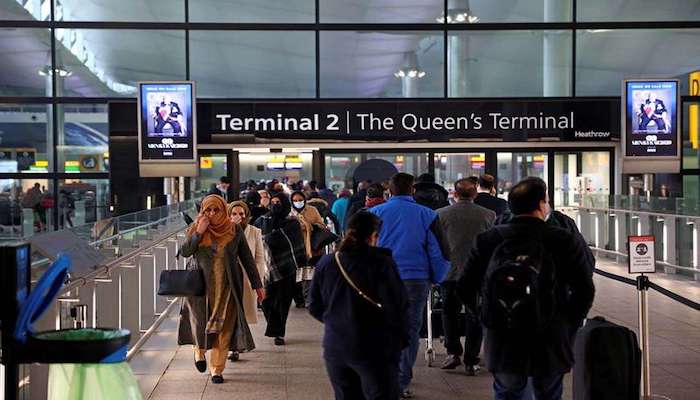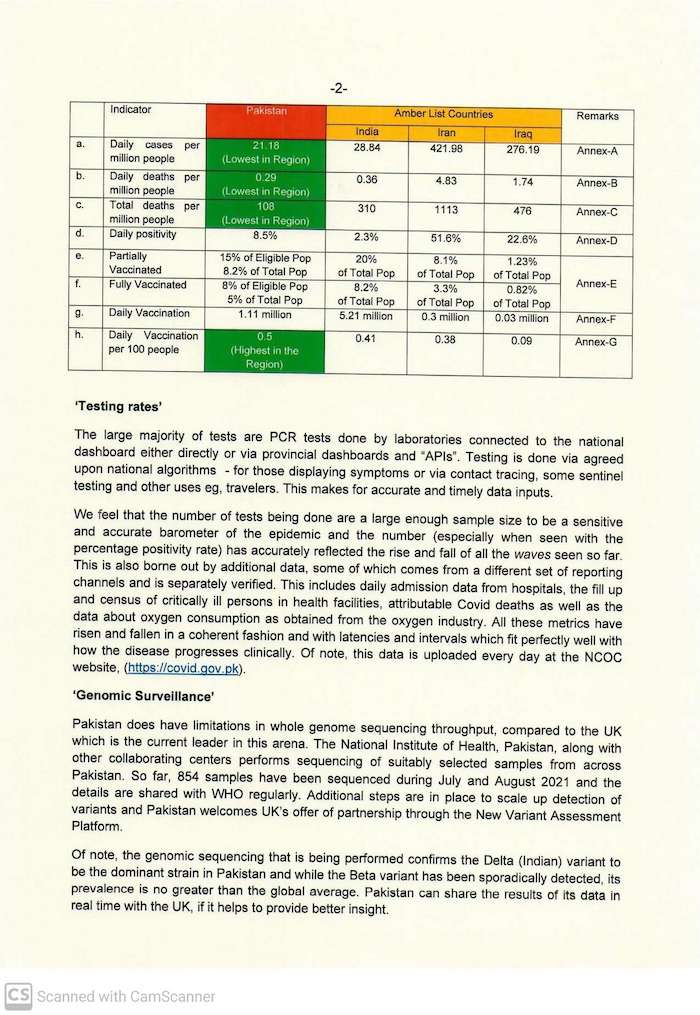Pakistan responds to UK statement on why it decided to retain country on red list
SAPM on Health Dr Faisal Sultan writes letter to UK health secretary giving facts and figures, solution to travel ban
August 11, 2021

- Pakistan addresses UK's concerns in detailed letter amid red list travel ban issue.
- Dr Faisal Sultan says compares COVID-19 numbers of Pakistan with other countries in region who have been moved by UK to amber list despite "obvious disparities".
- Shireen Mazari says Pakistan's response "exposes" UK claims of decision being based on science and data.
The Pakistan government has responded to the UK government's reasons for keeping the former on its travel red list in a detailed letter written by Special Assistant to the Prime Minister on Health Dr Faisal Sultan.
The letter was shared Wednesday by Federal Minister for Human Rights Shireen Mazari on Twitter, saying that the table in Dr Sultan's letter "exposes" claims of the UK government that its decision was based on science and data.
"UK's Conservative govt with a strong Indophiles' presence playing discriminatory politics against Pakistan on Covid. The UK statement to which Dr Faisal has responded exposing its claims!" wrote Mazari.
What does Pakistan's letter to the UK say?
Dr Sultan’s detailed letter starts of by pointing out that UK’s decision to retain Pakistan on its red list and move other regional countries to it amber list has been received “with dismay” in Pakistan.
He clarified that Pakistan has “no interest in allowing” its nationals who pose a health risk to other societies to travel abroad. He said this is a shared global objective.
The SAPM on health highlighted UK’s explanation on why Pakistan is still on the red list and addressed it with support from data on Pakistan’s COVID-19 response, testing rates, genomic surveillance and all other efforts being taken by the Pakistan government to tackle the pandemic and stabilise the spread of the virus.
The UK, in a statement to the Pakistan government sent on August 6, had said that “a combination of deteriorating epidemiological situation, combined with low testing rates and limited genomic surveillance presents a high risk that an outbreak of a new variant, or existing variant of concern will not be identified”.
Issue of deteriorating epidemiological situation
On the “deteriorating epidemiological situation”, Dr Sultan presented a table comparing key indicators from Pakistan and some other countries in the region which currently sit on the amber list to illustrate what he referred to as “obvious disparities”. He said that when looking at counties track record of managing the epidemic, “numbers alone, without context, can be deceptive”.
According to the table’s data, while an uptick was seen in Pakistan’s numbers in the last few weeks, Pakistan, at the time of addition into the red list had very low numbers as compared to the numbers from other countries on the amber list.
The table shared by Dr Sultan can be seen in the image below.

Issue of testing rates
The SAPM on health then moved on to the issue of testing rates. He explained how the PCR tests in Pakistan were being conducted and highlighted that testing is done through “agreed upon national algorithms”. He explained how it makes for “accurate and timely data inputs”.
“We feel that the number of tests being done are a large enough sample size to be a sensitive and accurate barometer of the epidemic and the number, especially when seen with the percentage positivity rate, has accurately reflected the rise and fall of all the waves seen so far,” Dr Sultan wrote.
He also reiterated that all data is uploaded daily by the National Command and Operation Centre, the nerve centre of the country’s response to the COVID-19 pandemic, on its website (covid.gov.pk).
Issue of genomic surveillance
On the issue of genomic surveillance, the Pakistan government official agreed that the country does have limitations in whole genome sequencing compared to the UK. But he went on to provide the data that Pakistan does have available, highlighting that so far 854 samples have been sequenced during July and August 2021 and the details are shared with the WHO regularly.
He said additional steps are in place to scale up detection of variants and Pakistan welcomes the UK’s offer of partnership through the New Variant Assessment Platform.
He, however, said that to use genomic sequencing as a resin to deny travel from Pakistan “appears to introduce an unnecessary larger metric, whereas disease security can be reliable achieved via somewhat more targeted measures, vide infra”.
He also said that it was unclear what level of genomic sequencing surveillance would be deemed “enough” and questioned whether other counties were also being judged according to the same criteria.
The solution
Dr Sultan ended his letter with a suggestion to the UK on a three-pronged approach which may include valid proof of having received a WHO-approved vaccine, a PCR test (72 hours prior to departure) and a rapid antigen test at the airport, pre-departure.
"These measures ought to be able to provide the health security we are all collectively seeking," wrote Dr Sultan.
He said he would be happy to meet or discuss these meausres with health experts in the UK.
British govt 'shifting goalposts' to keep Pakistan on its Red List, says Mazari
Earlier, Federal Minister for Human Rights Shireen Mazari had slammed the UK government for keeping Pakistan on its red list of countries facing travel restrictions, saying that they never asked Pakistan for data related to the country's coronavirus situation to review their decision.
The minister was responding to a report in The News that quoted sources in the UK government as saying London had kept Pakistan on its Red List as the country had not provided UK authorities data on vaccination and testing.
In a sharply-worded tweet, Mazari said the UK government is dominated by 'Indophiles'.
"Ridiculous! UK govt, dominated by Indophiles and despite globally documented India's continuing disastrous handling of the COVID pandemic, moved India to the Amber List but keeps Pakistan on the red; then under pressure from Opposition MPs, gives feeble excuse that Pakistan didn't share data," she tweeted.
She further defended her stance, saying British authorities never asked for the data as the National Command and Operation Centre (NCOC) has "the most centralised & daily updated data bases anywhere & data shared with UK HC".
She criticised the UK government for 'shifting goalposts', noting that it had earlier said Pakistan had been placed on the Red List because more passengers from Pakistan compared to India were testing positive for COVID.
Boris Johnson says UK looking into Pakistan Red List data
Earlier, British Prime Minister Boris Johnson had said that the country was looking into Pakistan's placement on the red list.
The News had learnt that PM Boris Johnson made these remarks during a conversation with a Pakistani delegation at the Royal Military Academy Sandhurst where he was attending the Sovereign’s Parade as the Queen’s representative, to watch 243 cadets commissioned as army officers.
The PM’s remarks indicated that there was a chance that Pakistan may be moved to the amber list in a few weeks.
The Pakistani delegation included top envoy Moazzam Ali Khan and three other diplomats.
According to official sources, PM Johnson's remarks were in response to the Pakistani delegation raising the issue of the "red list" and how inconvenient it was for thousands of Pakistanis.
Johnson had assured the delegation that his government was looking at the data and "considering possibilities" based on scientific advice.











